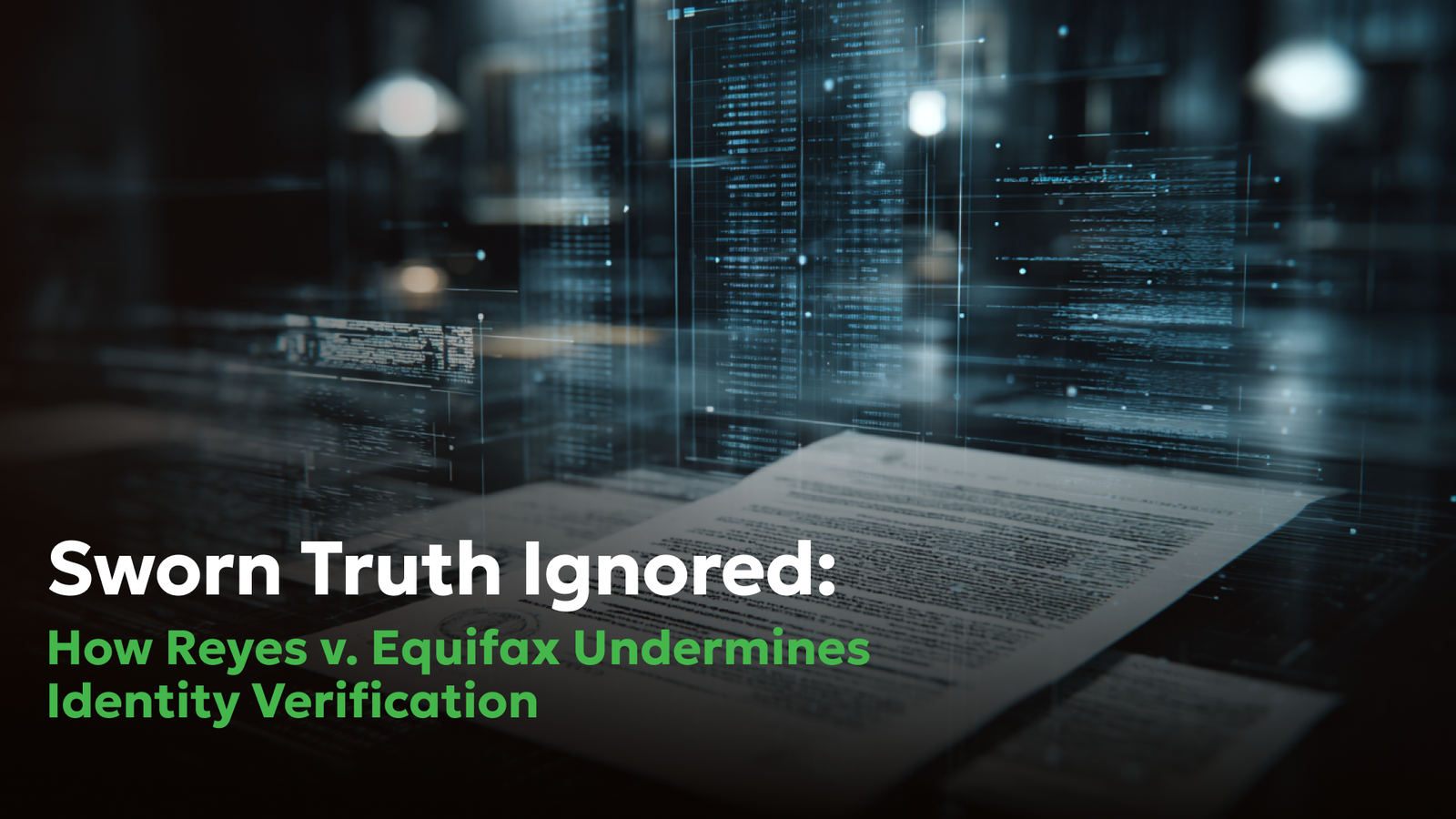Financial Identity Theft Definition
- Blog
- Credit Report Identity Theft
Financial Identity Theft Definition

Financial Identity Theft Takes a Toll on Your Finances and Your Life. Learn How to Prevent Fraud and Get Your Life Back.
Identity theft is illegal and aggravating. Identity thieves have no mercy when stealing your personal data. Fraudsters will stop at nothing to claim your identity and hard-earned credentials as their own. You can fight back! Check out our article to learn how working with Consumer Attorneys can help you before and after an identity theft attack.
Identity theft occurs when someone steals or uses sensitive and personal information like a Social Security number, birth date, name, etc., without the individual’s consent. The intent of identity theft is to commit fraud. Like identity theft, financial identity theft occurs when a thief unlawfully gains access to a victim’s personal and financial data in order to perpetuate fraud. Below are some Financial Identity theft examples of what identity thieves will steal or take when committing financial identity theft.
- Banking account numbers
- Credit card details
- Loan account numbers and details
- Tax return information
- Business financial statements and payment histories
What is Financial Identity Fraud?
The terms financial identity fraud (financial ID fraud) and financial identity theft are often used interchangeably; although there is a nuanced difference between these two. The aim of the two is the same – to benefit from another party. The main distinction between the two is the fact that financial ID theft occurs when a third party steals a person’s financial data and uses it to steal (usually money) from the victim’s account or someone else’s account. However, financial identity fraud is a bit broader and often involves the thief impersonating and misrepresenting themselves and information in order to steal and use data from someone’s personal and financial accounts.
Both financial fraud and financial info theft deal with stealing from a victim, but fraud takes criminal activity to another level when the stolen information is used to perpetrate more crimes. Below are a few instances of financial identity fraud.
- A criminal uses the victim's name and Social Security number to open bank accounts
- A thief submits an application for a loan using a victim's financial and personal details
- A perpetrator gains access to a victim’s credit card data and then uses it to purchase items either online or in person
- Hackers get access to specific financial information and use it to apply for new credit cards and accounts under the name of the victim
How to Protect Yourself
To protect yourself from financial scams and identity theft, you must be prudent and take precautions. To shield yourself from financial fraud and identity theft, it is important to remain proactive. Below are some helpful tips.
- Continue to pay attention to your credit reports
- Make sure you have strong passwords
- Use a password manager
- Enable two-factor authentication
- Install antivirus software to prevent attacks
- Keep devices updated with the latest software
Steps to Take if You are a Victim of Fraud
If you believe you are a victim of financial ID fraud, take the following steps immediately!
Step 1: Review Accounts and Contact Banking and Credit Card Institutions
Review your financial accounts in detail. If you believe your information is compromised, call your banking and credit card institutions immediately. They can take certain immediate actions to help mitigate (or lessen) any continuous fraudulent activity. Remember that it is generally not enough just to place a phone call. You likely need to also file a formal dispute. See below.
Step 2: File the Appropriate Paperwork
After reviewing your accounts, begin the paper trail process. You need to review and dispute all the charges on your accounts, no matter the type of services that have been targeted, including banks, credit accounts, or peer-to-peer platforms like Venmo and CashApp. Follow the instructions on the back of the billing statements on which the fraudulent charges are posted. Be sure to act quickly and be thorough. Certain federal and state laws offer you protection from fraudulent charges, accounts, withdrawals, etc., but your ability to dispute those activities is time-barred.
Step 3: File a Report with the Police and the FTC
The next step is to report identity theft to police. Make sure you get a copy of the police report. You should also file a complaint with the FTC. You can do so by visiting their website and calling their identity theft hotline.
Step 4: Put Fraud Alerts and Freezes on Accounts
You should contact the consumer reporting agencies or the “credit bureaus” (Experian, Equifax, and TransUnion) to let them know about the difference between credit alert and credit freeze. They can put fraud alerts on your credit reports. Along with fraud alerts, you can freeze your accounts to avoid any continued financial identity theft. The freeze will lock your credit files which makes it difficult for thieves to open new accounts in your name.
Step 5: Continue to Monitor and Update Accounts
Consistency is important if you’re a victim of fraud because if any new suspicious transactions occur, you can contact the appropriate parties immediately to freeze accounts and put more alerts on your credit profiles. Along with consistent monitoring, you should change your passwords regularly and utilize the tips mentioned above to protect your accounts in the future. Closely monitor your credit with the credit bureaus for an extended time to be certain they are not reporting fraudulent accounts as legitimate.
Step 6: Contact Consumer Attorneys ASAP
Contacting Consumer Attorneys can help expedite your recovery process. You can also move this step up and contact us sooner rather than later. At any point in your recovery process, we can provide crucial insight, guidance, and legal advice.
How We Can Help!
If you believe you are a victim of financial identity theft you can work with law enforcement to pursue criminal charges against the thieves. Identity theft lawyer will assist you by disputing fraudulent charges, loans, mortgages, accounts, and anything else the thief fraudulently put in your name. We also help you hold financial institutions and consumer reporting agencies accountable for failing to remove fraudulent accounts from your credit reports. We file a lawsuit on your behalf and typically work with you to settle and avoid trial. Contact us to learn more!
Frequently Asked Questions
What is Financial identity theft? Financial information theft occurs when somebody gets your personal and financial details like credit card or checking account numbers or Social Security numbers and starts using them in an unlawful way. This information gets stolen in a variety of ways, including breaching corporate data records via online scams, accessing your phone or laptop without your knowledge, or stealing data using skimming devices at point-of-sale purchases (e.g. while you’re out shopping). After getting your personal information, the thief can use it to steal money from your bank account, buy things with your card credit, obtain loans in your name, or commit other fraudulent acts for financial purposes of any kind at your expense.
Financial ID theft has several causes. Oftentimes, cases of theft are caused by careless data storage. Hackers can ease their way into data systems where there are loopholes in security. Also, human errors are also a cause that gives thieves access to data files. Some of the various methods of getting your information include email spoofs (spam), making use of unsecured websites and weak passwords, stealing your ATM pin, sifting through trash, or using electronic devices to access your card information while you’re out shopping. Protecting your information both online and off is crucial. You can begin protecting yourself more by using a password manager, never telling your sensitive passwords, and using two-factor verification when it is available.
Identity theft takes on different forms. The four that are usually the front runners are medical, financial, criminal, and child. Medical occurs when a criminal uses a victim's medical data for the purpose of obtaining medical attention or acquiring prescription medications. Financial is when financial details are used for illegal transactions or the creation of new accounts. Criminal identity theft is the act of giving another individual's identifying details to the police when arrested. Identity theft of children happens when a thief takes a child's personal information and uses it to open lines of credit and to make other fraudulent purchases.
The three D's of ID theft include deterrence, detection, and defense. Deterrence encompasses proactive steps that help prevent identity theft. This means guarding your personal details carefully, using robust passwords, and being careful about what you share or reveal online. Detection refers to using vigilance over your financial portfolio along with other personal documents to guard against potential threats or criminal actions. Defense means taking proactive steps to defend yourself against theft before it happens and also mitigating it by placing fraud alerts and freezes on accounts, contacting the FTC when necessary, and working closely with your banking institutions to maintain safe banking practices.
This regulation was made by the FTC and requires financial institutions and creditors to ensure that their processes include ID detection, prevention, and reduction. This rule mandates that businesses are set up to identify the possibility of identity theft at the time of creating accounts and conducting transactions. Warning signs (red flags) are characterized by suspicious account activity, mismatching personal info, or alerts from credit agencies. The Red Flag Rule's goal is to defend and protect consumers by helping to prevent the various forms of identity theft. If you believe you are facing any type of theft, please use our tips above and follow our steps.


Daniel Cohen is the Founder of Consumer Attorneys. Daniel manages the firm’s branding, marketing, client intake and business development efforts. Since 2017, he is a member of the National Association of Consumer Advocates and the National Consumer Law Center. Mr. Cohen is a nationally-recognized practitioner of consumer protection law. He has a we... Read more
Related Articles




R
ONGS™You pay nothing. The law makes them pay.







